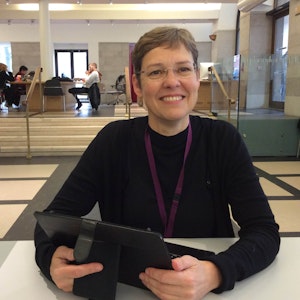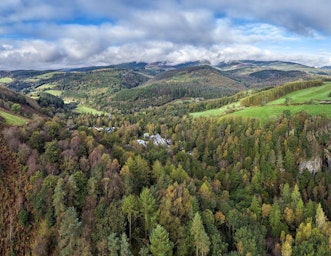
Sampling a Masters course at CAT: three perspectives
March 10, 2020Home » Sampling a Masters course at CAT: three perspectives
A Zero Carbon Future is possible, but we need people with the skills and knowledge to make change happen. The nine postgraduate courses delivered by CAT’s Graduate School of the Environment offer just that, enabling people to become more effective change makers in their chosen field.
With postgraduate courses covering a wide variety of subjects including food, natural resources, ecology, behaviour change, energy, adaptation, the built environment and sustainable architecture, our courses are respected all over the world for providing a big-picture, integrated approach to sustainability. The flexible approach to learning and study levels allows people with a wide range of ongoing commitments to attend the courses full-time or part-time, remotely via distance-learning or by attending on site for one week per module.
These on-site module weeks can also be taken as a short course (without the assignments) offering the opportunity to explore pressing and exciting topics in depth and find out what fellow students and professionals are doing to make a difference. We caught up with three people who recently joined the Graduate School of the Environment students on the Cities and Communities short course – part of the Sustainability and Adaptation Masters to hear why they wanted to join the course and what they got out of it.
Ruth Billingham
Ruth is the Neighbourhood Manager at Manchester City Council, and has over 30 years’ experience in local government.

What inspired you to join the course?
I am increasingly giving attention to climate issues, especially since the Council declared a climate emergency last year. The course looked really interesting and connected up climate, sustainability and cities – which is the area I am most interested in. I was very fortunate to be funded by the Council – it fits with our corporate objectives and will mean I am more effective at work. It was also an opportunity to sample studying at CAT.
What are the key things you took home from the course?
Models and examples of behaviour change and systems analysis, complexities of transport policy and how to reduce congestion, the leadership role of local government.
What was your experience of studying alongside students and a wider network of people in the field?
I really appreciated being with the other Masters students who were studying the whole range of courses. We did assignments together and there was a real mix of experience, background and expertise. The network of people delivering the lectures provided a wide range of subjects and expertise. The programme gave a good overview of the issues to be considered and plenty of scope to explore them more deeply through further reading and discussion afterwards. Being on a residential week, eating together and getting to know people, was a big plus and made the whole experience very enjoyable. I liked the fact that there was a mix of ages, experience and locations, and that everyone was there for one week of intense studying – it put us all on a level playing field.
How will you apply what you learnt during the week in your own life/projects? What are your future plans?
I am hoping it will inform some of the projects I am working on, for example air quality, behaviour change, engaging residents, the leadership role of local government. I am planning to do some cascade learning with colleagues to give a flavour of the key points and issues that I took away. I am also planning to apply for a full time Masters course at CAT.
Amy Grandvoinet
Amy is a part-time postgraduate literary studies student at Aberystwyth University and is also involved with a social forestry project run by local organisations Coed Lleol and Eco Dyfi.

What inspired you to join the course?
I first came to CAT in October 2018 as a full-time six-month volunteer in the Woodlands Team. During that time, I took the OCN Level 3 certified Sustainable Woodland Management and Social Forestry short courses facilitated by CAT and Coed Lleol. The skills and knowledge developed there have helped shape my work, studies, and activism at this moment of ecological and social crisis. Partaking in the Cities and Communities short course was inspired by that desire to think about appropriate potential uses and applications of learnings in sustainable woodland management and social forestry specifically.
What are the key things you took home from the course?
The Cities and Communities short course made me think about incremental and small changes, distinct from ‘radical’ grand theorising; about connecting with existing infrastructure to work for a just transition to a zero carbon future; about how culture(s) can and should remain heterogeneous and diverse in making change toward fairer systems; about the importance of democracy and freedom in all of this.
What was your experience of studying alongside students and a wider network of people in the field?
I made some new friends and enjoyed some – at least for me – helpful chats! I bonded over the oft-remarked distinct smell of the materials that construct the WISE building eco-toilets, the particularities of moss-types, enterprising ‘green’ projects and the pull of Bristol, and more.
How will you apply what you learnt during the week in your own life/ projects? What are your future plans?
Building on my background in the humanities and (mainstream) education, I’d like to think further about how I could best personally contribute my energy, combining practical conservation work within a broader critical and creative ecologically-minded and socially-conscious framework.
Chris Naylor
Chris is a freelance trainer focusing on councillors in local government, and currently lives off grid near the Welsh border. He has previously been a community councillor / housing lead for a London borough, had community-sector CEO roles and run several EU projects with City University London, having studied economics and politics originally.

What inspired you to join the course?
Living as I do I’m thinking everyday about energy use, water supply, resources. I’m directly affected by climate change, whether it’s when I can do my washing, check my emails, get my deliveries. I’m all too aware that we need to change how we live. Local government potentially has a really important part to play (and I’m delighted CAT recognises this) but the councillors we end up with – including me – have a real mix of concerns and talents. So I signed up for the course to inspire and energise my work, helping them get up to speed.
What are the key things you took home from the course?
The week was a great experience in so many ways. Most obviously the two-fold stimulus of on the one hand taught sessions, workshops, Q&As about key sustainability issues – and on the other being with 50 or more Masters students bringing a huge range of interests and experiences themselves. Many from the UK but many also from abroad; many young but many also in mid or late career.
What was your experience of studying alongside students and a wider network of people in the field?
Everyone was there because they wanted to be – you don’t get to CAT through Storm Dennis if not. There to think about practical or policy careers, or changing jobs or lifestyle in response to climate change. And so, everyone was interested in comparing notes, exchanging ideas – whether about rewilding, or moving off grid, or getting into politics. Even (separate) conversations about ash dieback and full bridge rectifiers. I’ll be staying in touch with several fellow students, short course and Masters.
How will you apply what you learnt during the week in your own life/ projects? What are your future plans?
I’m already now planning some simple training sessions. I find the CAT context a powerful reminder of different ways to design how we live and manage impact. Spending a few days in the impressive WISE building – with its rammed earth walls, its grass roofs, its simple human scale – exemplifies that.
Learn more about CAT’s Masters degrees
Find out more about joining Masters students for a module as a short course
- Graduate School
- Short Courses
- Climate Change
- Education
Related Topics
Related Pages
Related events


Virtual Open Day: MSc and MRes Courses
2nd May 2024
On-site Open Day: MSc & MRes Courses
17th May 2024

